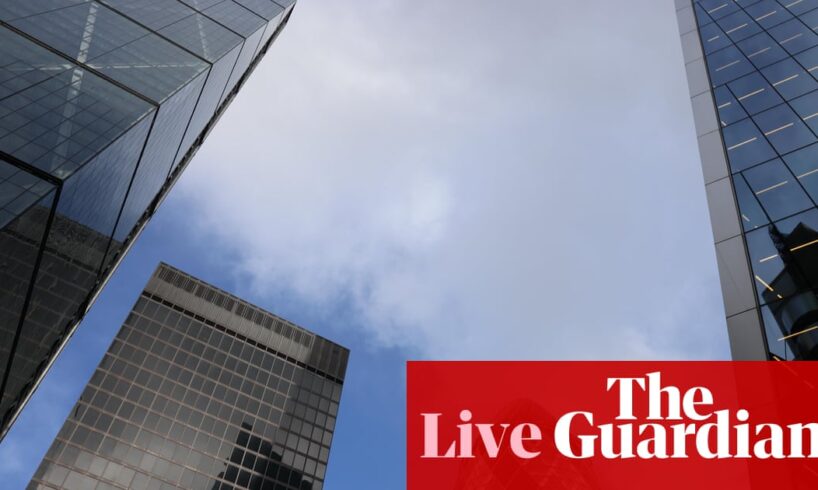
Pound falls and bond yields rise after UK borrowing soars
This morning’s UK public finances are going down badly in the City.
The pound has dropped by half a cent this morning, to $1.35. That puts sterling on track for its third daily fall in a row, as it drops back from Tuesday’s two-month high.
Government bonds are under pressure too, as traders react to the news that borrowing is £11bn higher than forecast so far this year.
The yield, or interest rate, on 10-year UK gilts (bonds) is up 4 basis points at 4.7% (up from 4.66% last night).
30-year gilt yields have also risen by 4bps, to 5.54%.
Kathleen Brooks, research director at XTB, says today’s public finance data puts the sustainability of borrowing and the size of UK state into question:
The pound has sunk on this data, and is testing support at $1.3500, it is the second worst performing currency in the G10 FX space today, and is lower by 0.33% vs. the USD. The UK’s bond market is extremely fragile, 10-year and 30-year yields rose sharply on Thursday, although global long end yields were higher, the UK was the weakest performer across Europe and the US.
UK bond yields could rise further on this news, especially as the Bank of England is maintaining its ‘careful and gradual’ approach to loosening monetary policy. Although the BOE has reduced the amount of bonds that it is offloading from its balance sheet, especially long end bonds, they are still shrinking their balance sheet albeit at a slower pace. Thus, the BOE cannot be relied on to relieve pressure on the long end of the Uk Gilt curve.
Share
Key events
Show key events only
Please turn on JavaScript to use this feature
Trump and Xi ‘hold phone call’
US president Donald Trump is holding a call with Chinese leader Xi Jinping today.
According to the Xinhua news agency, “Chinese President Xi Jinping on Friday held phone talks with U.S. President Donald Trump”.
It will be the first time the pair have spoken since June.
Trump said to reporters yesterday that they’ll focus on TikTok and trade on their call, saying:
“We’re very close on all of it.”
Earlier this week, Washington and Beijing struck a framework agreement on transferring TikTok to US-controlled ownership.
However, there have been suggestions from China that Beijing would retain control of the algorithm that powers the site’s video feed.
Our US Politics Live blog is will be tracking events:
Share
Weaker-than-expected tax receipts this financial year are pushing UK borrowing higher than expected.
The Office for Budget Responsibility has explained today that central government accrued receipts in the first five months of 2025-26 were £6.1bn below forecast, while spending is pretty much in line with expectations.
Monthly HMRC cash receipts were £4.1bn less than expected in August.
According to the OBR:
Cash VAT receipts were £12.8bn in August, £3.2bn below forecast
PAYE income tax and NICs cash receipts were £36.8bn in August, is very close to forecast
Self-assessed (SA) income tax and capital gains tax cash receipts were £1.5bn in August, which is £500m below forecast.
Share
Goldman Sachs has dropped its forecast that the Bank of England will cut interest rates in November.
It now expects the next cut in February, followed by quarterly cuts that will bring Bank rate down to 3% by the end of 2026.
Goldman economists James Moberly and Sven Jari Stehn say they no longer expect a cut in November, given elevated inflation (which stuck at 3.8% last month) and the Bank’s “hawkish commentary” yesterday, when it left rates at 4%.
They insist, though, that there are “compelling reasons” for Bank Rate to ultimately fall more than priced, adding:
First, we look for weaker growth, labour market and inflation data than the MPC over the next quarters. Second, we expect a significantly contractionary Budget on November 26. Third, our analysis points to a neutral policy rate of around 3%.
Share
Budget tax rises predicted
Economists are predicting tax rises in the autumn budget, following the rise in borrowing in August.
Elliott Jordan-Doak, senior UK economist at Pantheon Macroeconomics, has warned that the task facing Rachel Reeves is now far worse:
He said:
“Today’s figures suggest the Chancellor will need to raise taxes by more than the £20 billion we had previously estimated.
“We still expect the Chancellor to fill the fiscal hole with a smorgasbord of stealth and sin tax increases, along with some smaller spending cuts.”
Shaun Moore, tax and financial planning expert at Quilter, says Reeves is “hemmed into a corner”, after Labour ruled out increasing income tax, NICs or VAT for working people.
Moore adds:
With a £22bn fiscal hole to fill and the most obvious levers off the table, attention inevitably shifts to other taxes. Inheritance tax is already on the rise, with receipts totalling £3.7 billion so far this year – £0.2 billion higher than the same period in 2024.
Frozen thresholds, high property values, and the scheduled inclusion of pensions in 2027 mean IHT is set to grow further, making it a tempting, if controversial, source of additional revenue.
Share
UK banks are among the fallers on the London stock market this morning – perhaps a sign that investors suspect they could face new taxes in the budget.
NatWest (-2.5%), Lloyds Banking Group (-2%) and Barclays (-1%) are all down, after this morning’s public finances showed UK borrowing this fiscal year is running £11bn over forecasts.
There were calls this summer a windfall tax on large lenders in the autumn budget, to help fill the shortfall in the chancellor’s plans.
The IPPR thinktank argued that the banks should hand back some of the profits they are now making on their reserves at the Bank of England, accrued through its ‘quantitative easing’ stimulus programme which is now being slowly unwound.
Share
Updated at 12.51 CEST
Simon French, chief economist at UK investment bank Panmure Liberum, highlights how the UK’s borrowing situation has deteriorated since last summer’s election:
The deterioration in both the total UK borrowing requirement (£162bn; 12m rolling) and current budget deficit (£86bn) is pretty stark since last year’s General Election. Borrowing to fund investment – as the fiscal rules changes of October 2024 provided air cover to do – is more… pic.twitter.com/YbRjTM53iy
— Simon French (@Frencheconomics) September 19, 2025
Share
Insolvencies rise, amid record number of debt relief orders
The number of people entering insolvency in England and Wales has jumped, suggesting more households are struggling.
In August 2025, 11,348 individuals entered insolvency in England and Wales, new data from the Insolvency Service shows. This is 7% higher than in July 2025 and 16% higher than a year ago.
This included 622 bankruptcies, 4,239 debt relief orders (DROs) and 6,487 individual voluntary arrangements (IVAs).
That’s the highest number of monthly DROs since they were introduced in 2009.
A chart showing UK personal insolvencies Photograph: The Insolvency Service
Debt relief orders (DROs) were introduced in England in Wales in 2009 as a low-cost alternative to bankruptcy for people struggling with debts. They let people freeze their debts for a year then write it off completely if their finances haven’t changed.
Share
The Office for Budget Responsibility, Britain’s fiscal watchdog, has confirmed that UK borrowing this financial year is £11.4bn above its forecasts.
In its latest commentary on the UK public sector finances, the OBR explains:
The overshoot in this month’s estimates compared to our March forecast profile is primarily due to revisions which have increased estimated borrowing by local authorities so far this year. In addition, VAT and other receipts were lower-thanexpected in the month of August.
A chart showing the UK public finances Photograph: OBRShare
Nvidia to invest £2bn in UK tech firms
Robert BoothNvidia CEO Jensen Huang attending a business leaders reception on Tech Prosperity Deal, hosted by U.S. President Donald Trump and British Prime Minister Keir Starmer at Chequers yesterday Photograph: Kevin Lamarque/Reuters
US technology giant Nvidia has pledged to invest £2bn investment in UK tech companies.
Nvidia founder and chief executive Jensen Huang announced the investment last night at a packed event attended by hundreds of venture capitalists and entrepreneurs in London’s King’s Cross, our UK technology editor Rob Booth reports.
He was joined on stage by the prime minister Keir Starmer as he announced a list of UK companies in which Nvidia would invest. One by one, Huang called out the names of AI firms including the driverless car start-up Wayve, Basecamp Research, which is involved in life sciences, video platform Synthesia and finance app Revolut and yelled: “I’m going to invest in your next round”
Huang also gave Starmer a gift, a DGX1 which he described as the world’s first AI supercomputer. It was inscribed with the message: “Prime Minister Starmer, this is the age of AI. A new industrial revolution begins”.
Huang ended his presentation, which included appearances by the UK secretaries of state for business and science and technology, Peter Kyle and Liz Kendall, and the US commerce secretary Howard Luttnick, saying to the audience of tech firms: “I love you guys, I’m looking forward to making a fortune off of all of you”.
In a sign of rising pressure on Downing Street not to implement tough AI regulations that would affect US investors and tech firms, the US commerce secretary Howard Luttnick, said “we need standards not safety”.
Addressing the UK business secretary Peter Kyle, Luttnick said:
”In order to win the race to AGI we must arm our best entrepreneurs, our best innovators, our best engineers….It’s key that you deliver the regulatory infrastructure framework so that the smartest people here feel good about that investment.”
Nvidia’s investment pledge came just hours after it announced plans to invest $5bn in Intel.
It also comes alongside a multibillion-dollar transatlantic tech agreement announced as Donald Trump arrived in the UK – here’s our breakdown on what was announced, and what is new:
Share
Updated at 11.07 CEST
A chart showing UK borrowingShare
Retail sales rise in Great Britain as warm weather boosts clothing purchases
Mark Sweney
In better economic news, retail sales rose last month, thanks to back-to-school shopping and warm weather.
Total retail sales in Great Britain rose 0.5%, the Office for National Statistics (ONS) said, as parents prepared for the new school year and shoppers enjoyed a series of heatwave and the summer’s last bank holiday.
The figure was slightly higher than the 0.4% increase that some analysts had forecast.
The ONS, which revised its estimate for July’s monthly sales growth down from 0.6% to 0.5%, also said that non-store retailing, primarily online shopping, increased in August.
Clothing sales rose 1.3% month on month in August, boosted by the warm conditions, while there was a 1.1% monthly increase in non-food stores sales – the total of department stores, household and other non-food stores.
More here:
Share
Saxo: “sterling gets the treatment as government borrowing gets out of control”
Today’s borrowing figures – showing a huge jump ahead of official forecasts – lays bare the challenge facing the UK, warns Neil Wilson, UK investor strategist at Saxo Markets.
He adds:
Sterling is rightly getting the treatment because the borrowing is a) too high, b) unsustainable, c) out of control and d) never going to change.
The pound is indeed continuing to slide – it’s now down two-thirds of a cent, at $1.3483, the lowest in almost two weeks.
Share
Source





